About the Department
The Department of Chemical Engineering at Prince of Songkla University holds the distinction of being the first chemical engineering department founded in Thailand. It stands as a leading institution in its field, recognized as the top program in southern Thailand and among the nation's top ten. It produces skilled engineers who not only contribute to both Thai and global industries but also drive innovation, enhance productivity, and uphold the standards of professional in every sector they engage with.
Vision and Mission
Bachelor Degree in Chemical Engineering Program at Prince of Songkla University aims to produce globally competitive engineers, who excel in innovation, sustainability, leadership, lifelong learning, and uphold ethical standards meeting the demands of the global chemical industry. We currently aim to be an accredited organization of Accreditation Board for Engineering and Technology (ABET).
Vision and Mission Statement of Chemical Engineering Department
Vision: To become a leading Chemical Engineering Department in Southeast Asia focusing on producing impactful and innovative graduates while creating research excellence contributing to the sustainable development of the country and global society.
Mission: Our mission is to produce innovative and impactful engineers who are internationally competitive and committed to sustainable development. Cutting-edge skills and knowledge are integrated through a dynamic education that bridges theory and practice, empowering graduates to contribute to global sustainability and research excellence.
Program Educational Objective
The Program Educational Objectives for the Chemical Engineering Program have been established as follows:
| PEO1 | Graduates practice proficiently in public and private sectors related to chemical engineering, petrochemicals, hazardous substances, and biotechnology that require knowledge of chemical processes, engineering design, systematic thinking, and problem-solving skills. |
| PEO2 | Graduates pursue their professional growth through advanced study and strategic engagement of independent life-long learning. |
| PEO3 | Graduates display leadership, professionalism, ethical and social responsibility with contemporary and global outlook to contribute their expertise to support community development and professional societies. |
Program Constituencies
The Chemical Engineering program considers the constituencies in the following lists;
- Alumni
- Employers
- Industry Advisory Board (IAB)
- Faculty (Curriculum Committee/ Faculty Committee)
The Chemical Engineering program is tailored to meet the needs of the stakeholders and is regularly reviewed by the Department Chair and program committee.
The relationship of each of these constituencies with the program is described below.
- Alumni: Each year, chemical engineering alumni are surveyed to gather information about their current activities and assess how well they align with the program's educational objectives. This evaluation helps identify if any adjustments are needed to improve the performance of future alumni in their careers. Alumni records are collected at graduation and regularly updated to ensure maximum participation in the annual online survey.
- Employer: Employers play a crucial role as key stakeholders in the curriculum. Their needs are assessed annually through surveys of managers who directly supervise graduates or mentor interns and cooperative education students. The program committee also aids in analyzing the survey results from industry stakeholders, alumni, and graduating students.
- Industrial Advisory Board (IAB): The IAB consists of various regional companies and organizations within the industry that regularly recruit chemical engineering graduates. The IAB team provides guidance on all aspects of the curriculum, including core content, essential student skills, and organizing activities to enhance student potential. As employers, the IAB’s needs are assessed annually through surveys of managers who directly supervise the graduates. The IAB also helps evaluate the survey results from industry stakeholders, alumni, and graduating students.
Members of Industrial Advisory Board (IAB) (2022-2026)
| Member | Affiliation | Position | |
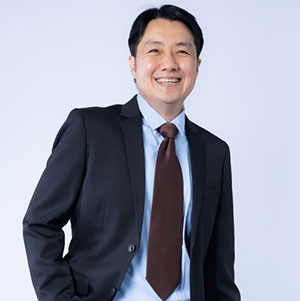 |
Mr. Kittipong Chernwattanachai | Vice President, Operations Chevron, Thailand Exploration and Production, Ltd | Chair |
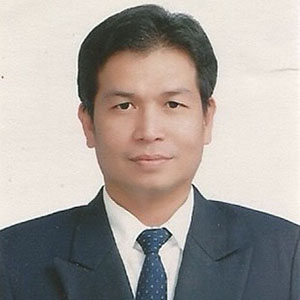 |
Mr. Khwanchart Sainoi | Counselor Accepted Engineering & Consultant Co.,Ltd. | Vice Chair |
 |
Mr. Teerarad Onrueng | General Manager TOYO-THAI CORPORATION PUBLIC COMPANY LIMITED (TTCL) | Committee |
 |
Mr. Bancha Lolharat | SSHE supervisor | Committee |
 |
Mr. Rewat Thaithong | Engineer, Professional Level Department of Industrial Works, (Assistant Permanent Secretary for Industry) | Committee |
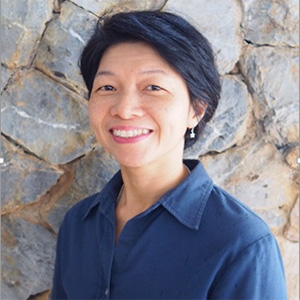 |
Assoc. Prof. Kulchanat Prasertsit (Ph.D) | Department of Chemical Engineering Prince of Songkla University | Secretary |
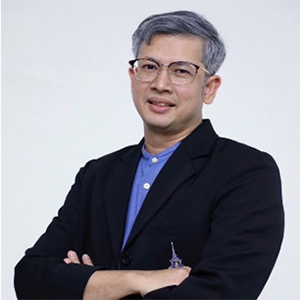 |
Assist. Prof. Parinya Khongprom (D. Eng.) | Department of Chemical Engineering Prince of Songkla University | Assistant Secretary |
Students Outcomes (SOs)
Graduates of the Chemical Engineering Program will have attained the following outcomes by the time of graduation.
- An ability to identify, formulate, and solve complex engineering problems by applying principles of engineering, science, and mathematics
- An ability to apply engineering design to produce solutions that meet specified needs with consideration of public health, safety, and welfare, as well as global, cultural, social, environmental, and economic factors
- An ability to communicate effectively with a range of audiences
- An ability to recognize ethical and professional responsibilities in engineering situations and make informed judgments, which must consider the impact of engineering solutions in global, economic, environmental, and societal contexts
- An ability to function effectively on a team whose members together provide leadership, create a collaborative and inclusive environment, establish goals, plan tasks, and meet objectives
- An ability to develop and conduct appropriate experimentation, analyze and interpret data, and use engineering judgment to draw conclusions
- An ability to acquire and apply new knowledge as needed, using appropriate learning strategies
Note: Minimum requirement to achieve the SO is 70%, which is calculated based on 80% weight of direct assessment (40% weight of each course) and 20% of indirect assessment.
Student Admissions
Students who have completed Mattayom 6 (grade 12) or an equivalent level of physical and mental fitness, free from conditions that, according to committees, could potentially impede academic pursuits or engineering careers, are generally eligible to enroll in the Chemical Engineering program. Applicants are mandated to meet the following criteria according to Thai University Central Admission System (TCAS) which provides in four rounds for admission to the program:
- TCAS 1 eligibility is limited to high-potential candidates who have demonstrated exceptional performance in their portfolio and have accumulated a cumulative grade point average (GPAX) of 2.5 or higher during their first five semesters in the math-science program. MATH (10 credits) GPA>2.5, Science and Technology (20 credits) >2.75 and English (7 credits) >2.5 with their portfolio.
- TCAS 2 Regional Quota: Applicants must be enrolled in academic institutions or schools in the southern region of Thailand at the time of application. GPAX, GPA, TGAT/TPAT, A-Level are required. To apply through the projects listed below:
- Project to select talented people in sports
- Project in which students in 14 southern provinces enter education through direct admission. (regional quota)
- Project under the University's Office of Science Inspection (WVM)
- Project in collaboration with the Foundation for the Promotion and Support of Academic Science Standards under the patronage of Her Royal Highness Princess Galyani Vadhana Krom Luang Narathiwat Rajanagarindra (STI).
- Project to accept investors from abroad for additional study. /li>
- TCAS 3 Admission, which is open for applicants from all over Thailand. Applicants must hold a test result from TCAS and apply through the Council of University Presidents of Thailand. The criteria are mainly calculated based on these subjects: Applied Math, Physics, Science, Chemistry, Technology, and Engineering competency (TPAT3). The requirement are:
- Minimum GPAX 2.75
- Minimum credits for Math courses 12
- Minimum credits for Science and technology courses 22
- Minimum English or foreinge language courses 9
- Minimum course score Thai General Aptitude (TGAT) 1
- Minimum course score Thai Professional Aptitude Test for for Science, Technology, Engineering (TPAT3) 25
- TCAS 4 "Quota Engineering University" project (Direct admission is the last round of admission reserved for those whose academic status was terminated the year prior).
Applicants are ranked in each round in accordance with their examination results. In interviews, only the top performers are invited to participate. There is no particular rationale for conducting an interview. Since applicants' TPAT (Thai Professional Aptitude Test) scores account for most of the overall application scores. In addition to personality, the interview committees consider maturity and communication skills. After an applicant gets accepted, each of them has only one right to confirm their enrollment in a program. The applicant is permitted to submit applications for multiple programs or rounds; however, they will be unable to apply for the subsequent round unless they decline their enrollment in the program, which must be done prior to confirming their enrollment. It is imperative that the system manage the verification and decline of enrollment within the specified timeframe. The enrollment decline is achievable only once and within the designated timeframe.
There are 2 methods to enroll to chemical Engineering program:
- TCAS 1 or TCAS 2 students can apply for Chemical Engineering directly at first.
- If students do not specify program first, they can apply for Chemical Engineering after completing their first semester which requires 8 courses (Introduction to engineering, math, mechanical, electrical, chemistry, drawing, programming and English). Students have the right to apply to the program. If the number of students applying to the program is greater than the seats, ranking from GPA of 8 courses are considered.
The figures for enrollment and graduation from 2017 to 2024 are summarized in Table 1-1.
Table 1.1 Number of enrolled students and graduates
| Academic Year | Enrolled Students | Graduates |
|---|---|---|
| 2017 | 61 | 59 |
| 2018 | 65 | 61 |
| 2019 | 60 | 60 |
| 2020 | 69 | 68 |
| 2021 | 66 | 58 |
| 2022 | 62 | |
| 2023 | 64 | |
| 2024 | 73 |
Admission to the Chemical Engineering Program for Academic year 2024
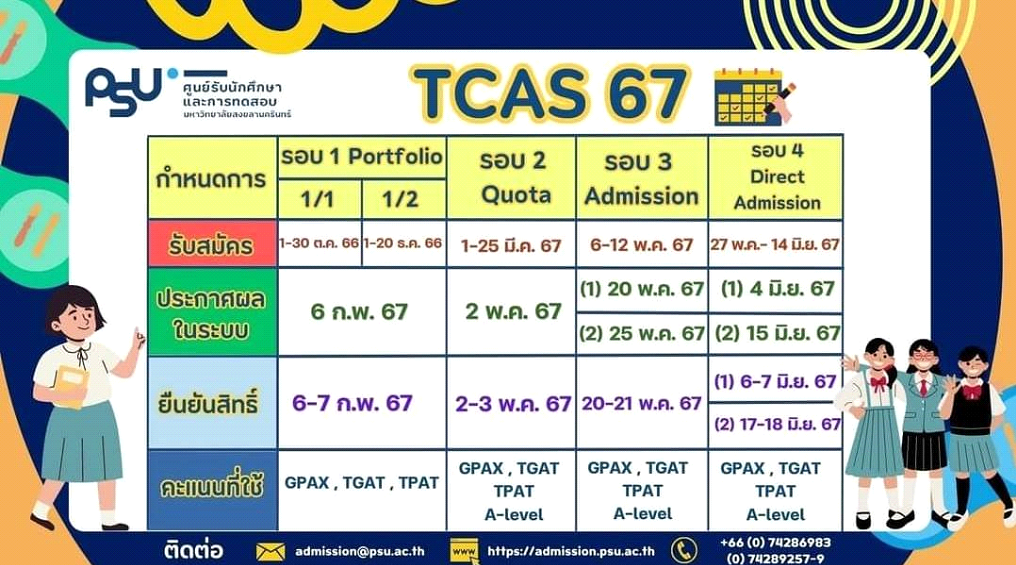
To graduate from the Chemical Engineering Program at Prince of Songkla University and receive the Bachelor of Engineering in Chemical Engineering degree, a student must meet all of the following requirements:
- Pass an approved English proficiency test, such as the TOEFL, IELTS, TOEIC, or PSU-TEP (Prince of Songkla University Test of English Proficiency).
- Pass the senior (capstone) project course.
- Pass the Engineering training course (minimum of 320 hours of Engineering Training in the industrial sector).
- Achieved minimum CUM GPA of 2.00.
- Achieved minimum CUM GPA (for Engineering courses) of 2.00.
- Completed and passed all BE. (Chemical Engineering) degree requirements as follows:
| General Education | 24 credits |
| 200-103 Modern Life for Green Love | 2 |
| 001-102 The King’s Philosophy and Sustainable Development | 2 |
| 388-100 Health for All | 1 |
| 950-102 Happy and Peaceful Life | 3 |
| 895-001 Good Citizens | 2 |
| 230-001 Benefit of Mankinds | 1 |
| 200-107 Internet of Thing for Digital life | 2 |
| 234-566 Idea Creation for Innovation | 1 |
| 890-xxx GE 6 Language and Communication | 4 |
| xxx-xxx GE 7 Aesthetics and sports | 1 |
| xxx-xxx GE 5 Systematic thinking, Logical and Numerical thinking | 2 |
| 895-xxx GE 7 Sports | 1 |
| xxx-xxx GE 5 Systematic thinking, Logical and Numerical thinking | 2 |
| Math & Basic Science | 30 credits |
| 200-112 Fundamental Mathematics for Engineer | 3 |
| 200-113 Fundamental Physics for Engineer | 3 |
| 200-114 Fundamental Chemistry for Engineer | 2 |
| 230-101 Basic Chemistry in Chemical Engineering | 3 |
| 230-141 Basic Chemistry Laboratory in Chemical Engineering | 1 |
| 230-203 Mathematics Chemical Engineering I | 3 |
| 230-304 Mathematics Chemical Engineering II | 3 |
| 324-249 Analytical Chemistry I | 3 |
| 347-206 Statistic | 3 |
| 324-349 Analytical Chemistry II | 3 |
| 328-303 Basic Bio-Chemistry | 3 |
| Engineering Topics | 84 credits |
| 200-111 Into Engineering World | 2 |
| 200-115 Basic Electrical Engineering | 3 |
| 200-116 Basic Engineering Programming | 3 |
| 200-117 Basic Engineering Drawing | 2 |
| 237-111 Engineering Materials | 2 |
| 230-201 Material and Energy Balances | 4 |
| 230-202 Chemical Engineering Processes | 3 |
| 230-211 Fluid Mechanics and Applications | 4 |
| 230-212 Thermodynamics | 3 |
| 230-241 Fluid Mechanic and Particle Laboratory | 1 |
| 230-213 Chemical Engineering Thermodynamics | 3 |
| 230-214 Heat Transfer | 3 |
| 230-221 Chemical Engineering Kinetics and Reactor Design | 3 |
| 230-301 Economics and Applications | 3 |
| 230-321 Unit Operations I | 3 |
| 230-331 Chemical Engineering Equipment Design | 3 |
| 230-242 Chemical Engineering Laboratory I | 1 |
| 230-344 Industrial Excursion | 0 |
| 230-322 Unit Operations II | 3 |
| 230-330 Module: Environmental Control and Safety in Chemical Engineering Operations | 7 |
| 230-343 Chemical Engineering Seminar | 1 |
| 230-345 Pre Practical Training | 1 |
| 230-346 Practical Training | 0 |
| 230-421 Integrated Knowledge in Chemical Engineering | 3 |
| 230-430 Module: Chemical Engineering Plant Design and Chemical Process Simulation | 6 |
| 230-431 Process Dynamics and Control | 3 |
| 230-341 Chemical Engineering Laboratory II | 1 |
| 230-442 Chemical Engineering Project I | 1 |
| 230-443 Chemical Engineering Project II | 3 |
| xxx-xxx Chemical Engineering Elective | 3 |
| xxx-xxx Chemical Engineering Elective | 3 |
| xxx-xxx Chemical Engineering Elective | 3 |
| Free Elective | 3 credits |
| xxx-xxx Free Elective | 3 |
| Total | 141 |
Capstone Design project
All students in the Chemical Engineering Program at PSU gain the majority of their design experience in the course “Integrated Knowledge in Chemical Engineering” (CENG 421). The course focuses on the capstone design project, where teams of four to five students are tasked with designing an assigned chemical process. The key objective is to apply the basic science, engineering principles, and design knowledge acquired throughout the curriculum to a practical design process. These capstone projects involve the design of real-world chemical engineering processes, incorporating actual economic, safety, environmental, ethical, and design constraints in accordance with relevant codes and standards. Each team developed their own solution to the design problem and submitted a written technical report. Additionally, each team delivered a 20-30 minute presentation to the program faculty.
The figure is a flowchart illustrating the prerequisites structure of the PSU Chemical Engineering program’s required courses.
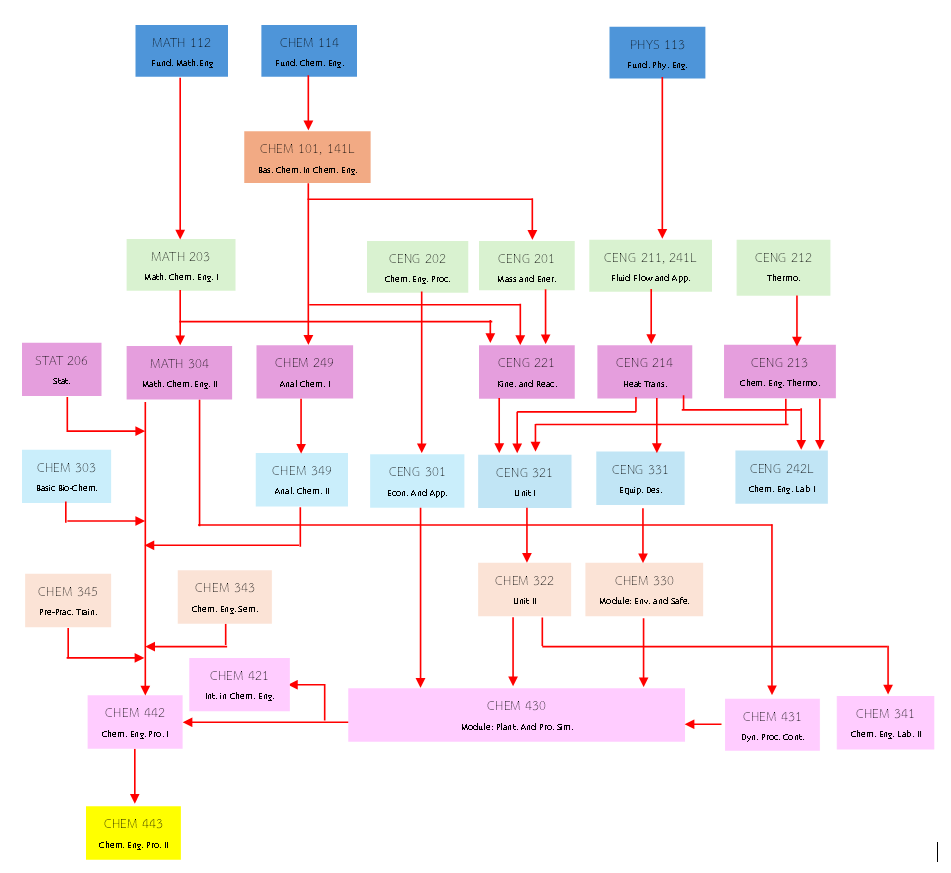
Program Accreditation
The Bachelor of Engineering in Chemical Engineering at Prince of Songkla University has been in Recognition of Engineering Degree Qualification by The Council of Engineers Thailand (COET) since 2001 for practicing the Regulated Engineering Profession
(refer to https://service.coe.or.th/check_course_certification/CourseDisplay).


